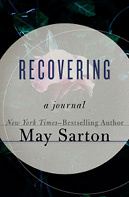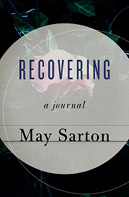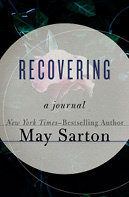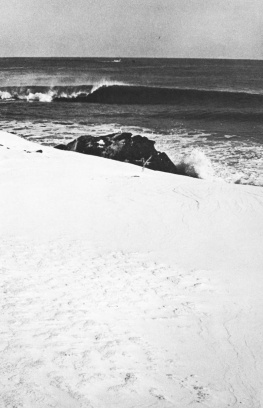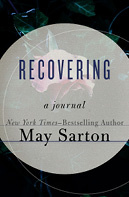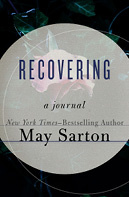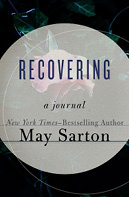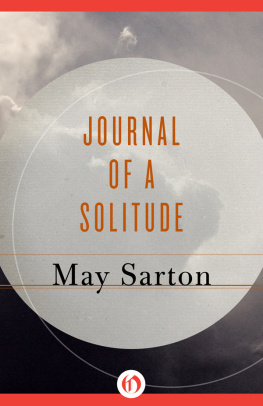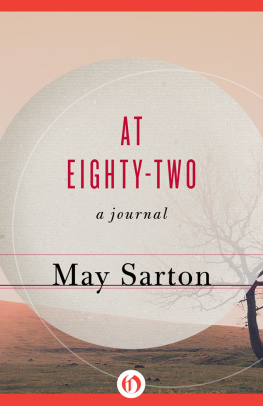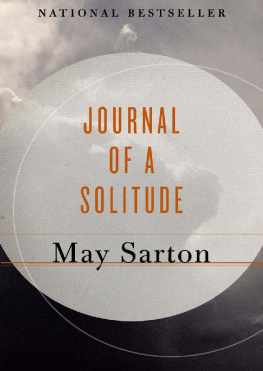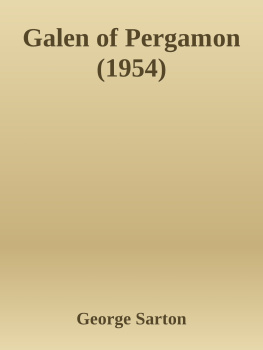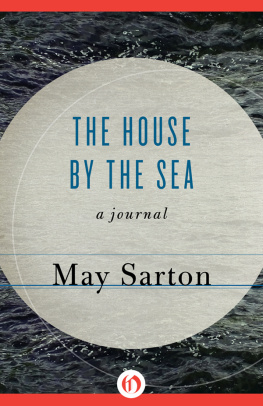Encore
A Journal of the Eightieth Year
May Sarton

For Susan Sherman
Sunday, May 5, 1991
It is the second day of my eightieth year. The journal of my seventy-ninth year will come out for my eightieth birthday, but I want to go on for a while longer discovering what is really happening to me by keeping a journal.
The great good news is that I continue to have less pain and therefore have all kinds of hopes and plans and even dream of getting back once more to England. Even if that is only a dream I did not have dreams like that during the time of the pain which was for nearly a year. One good augury for this eightieth year: one of the florists who brought flowers for my birthday came rather lateI think it was after fiveand said she had seen an enormous turtle, tortoise, crossing the road. I rejoiced because this turtle was here long before I came. She is thought to be one hundred years old. Every year about this time she crosses the place to find, I presume, a nest for her eggs. We never see her during the rest of the year.
Yesterday was a day that brought me friends whom I really think of as family, who come every year, Anne Woodson and Barbara Barton. This year it was the day after my birthday, on purpose, because I knew that there would be a great deal happening on the actual day. I needed what solitude I could get if only to decide where all the flowers should go and in some cases to arrange them. By the end of the day seventeen deliveries of flowers had been made to this houseit does seem incrediblefrom three different florists. I must say that Forsters is by far the most imaginative. The thing I loved most, because there were lots of plants as well as flowers, is a moth orchid Martha Wheelock sent me from Hollywood. Janice brought me a videotape of Marthas wonderful Ishtar film of me, World of Light: A Portrait of May Sarton, which, until now, has been available only as a sixteen-millimeter movie. Nobody could see it unless they had a projector, screen, and all that. So this is a treat. It was such a perfect day, I think it may have been the best birthday I have ever had.
Anne and Barbara were out in the garden talking to Diane, the gardener, who was planting fifteen lilies for meagainst the terrace wall and some against the fence. Anne and Barbara came earlysuch a wonderful thingI was rather tired by then because I had been walking around, setting the table, and all that. I had been on my feet for more than three hours, which proves that I am getting better. Anyway they brought, as they always doand oh, how I love these traditions!a hanging fuchsia. It hangs over the border that I see from my chaise longue, that little center of life.
The whole luncheon was homemade because Janice actually made the lobster rolls. They were the most delicious I have ever had. Of course lobster is not on my diet. It is naughty but apparently it has done me no harm. Edythe had brought a superb angel cake with lemon frosting. It was so close it could be cut with a knife. Nancy brought the chocolate sauce and it turned out to be from a recipe of her mothers. All this was joyful and merry. I had a little glass of champagneagain, against the rulesbut it had an enormous effect. I have not had any alcohol for a month so I became very vocalvoluble is more the wordand began to talk about Brad Daziels preface to the book he edited, Sarton Selected.
Brad wrote this preface originally for something elsefor Connie Huntingand it was to deal with the letters I get. He never got down to what I wanted so the preface is beautiful but it is not what I wanted. I would like to say here, as I did after half a glass of champagne yesterday, what I did want. I did not want letters, and there are many of them, that talk about how wonderful my work is and praise itthey are so welcomeI did not want letters from famous people. And that, I had told Brad, is not the point either. What is the point? The point for me was the letters that say You have changed my life, or You helped my mother die, You have made my father able to read again because he got so interested, and he had stopped reading. My little son saidthis is going back to praising so I should not even quote it but I cannot resistmy little son, nine years old, said, Its the best book Ive ever read. That was The Fur Person.
These letters are in a folder called Total Work. They very often tell a life story. It is partly the people who have come to accept their sexual differences, been able to accept that it is not a sin to love a woman, that like any love, it can be good love or bad. Like any marriage it can be a good marriage or bad. I have given courage to some of them and to many peoplethis is more dubiousthe ambition to write. Very often they are middle-aged and have neither any idea of what good writing is nor the power to criticize their own writing. That is sad.
After the guests had left it was still early, because Anne and Barbara got here at eleven, so I had a wonderful rest. They did all the clearing up before they left. Then I had the enormous joy of sauntering around the garden, looking at the plants that were coming up. I had thought the garden was a disaster area but found that a great deal had come up. There have been some losses. Every year the tree peonies suffer a little more, except for one tall, thin one protected by juniper bushes. It is going to have two or three flowers this year. They are whitethe white, God-like tree peonies. It looks as if the columbine has more or less gone. I may find some at a nursery where Nancy and I are going to buy perennials on Tuesday. It is her birthday present to me. I cant wait.
Also on that afternoonand this was a celebration of my return to being myselfI put in four little Johnny-jump-ups that had been waiting for help. I have not been able to garden for a year, so this was a triumphant moment.
A Biography of May Sarton
May Sarton (19121995) was born Eleanore Marie Sarton on May 3 in Wondelgem, Belgium, the only child of the science historian George Sarton and the English artist Mabel Eleanor Elwes. Barely two years later, Sartons European childhood was interrupted by the assassination of Archduke Franz Ferdinand and the onset of the First World War.
Fleeing the advancing Germans, the family moved briefly to Ipswich, England, and then in 1915 to Boston, Massachusetts, where her father had accepted a position at Harvard University. Sartons love for poetry was first kindled at the progressive Shady Hill School, a period she wrote about extensively in I Knew a Phoenix, published in 1959.
At the age of twelve, Sarton traveled to Belgium for a year to live with friends of the family and study at the Institut Belge de Culture Franaise. There, she met the schools founder, Marie Closset, who grew to be Sartons close friend and mentor, and who was the inspiration for her first novel, The Single Hound (1938).
On returning to the States, Sarton graduated from Cambridge High and Latin School in 1929. Although she was awarded a scholarship to Vassar College, Sarton joined actress Eva Le Galliennes Civic Repertory Theatre in New York instead, much to the dismay of her father. However, while learning the basics of theater, Sarton continued to develop her poems, and in 1930, when she was just eighteen, a series of her sonnets was published in Poetry magazine.
In 1931, Sarton returned to Europe and lived in Paris for a year while her parents were in Lebanon. In large part, Europe provided the backdrop for her encounters with the great thinkers of the age, including the novelist Elizabeth Bowen, the famed biologist Julian Huxley, and of course, Virginia Woolf. After Sartons own theater company failed during the Great Depression, she turned her full attention to writing and published her first poetry collection, entitled
Next page
